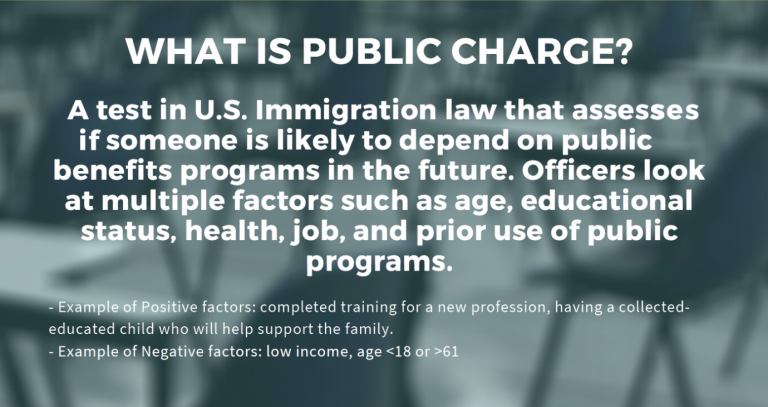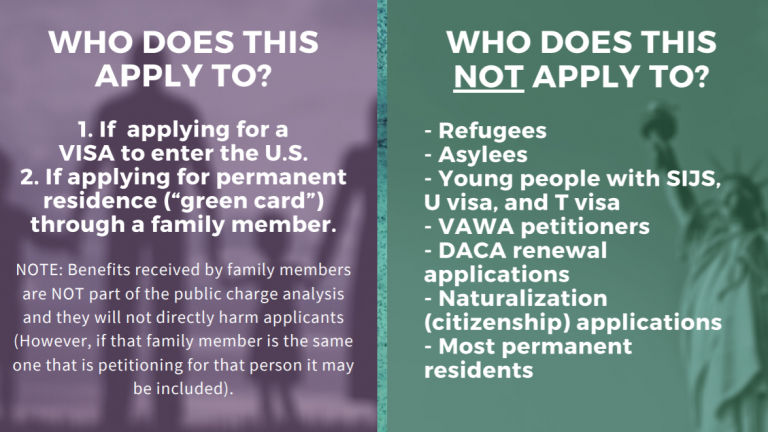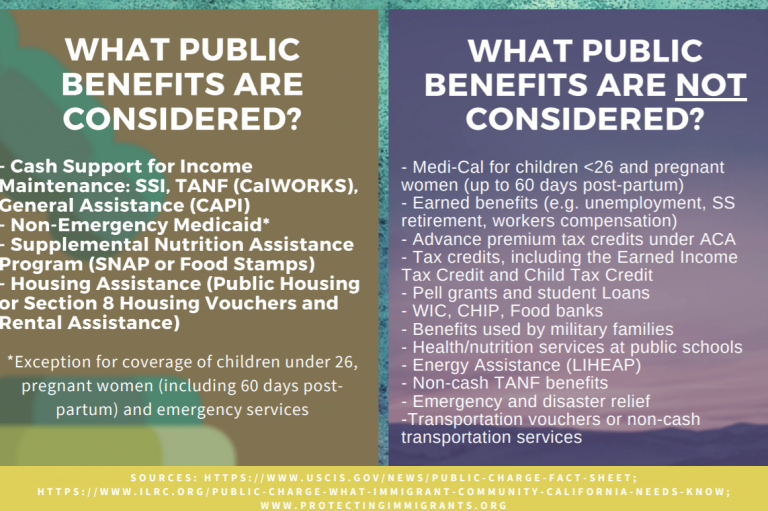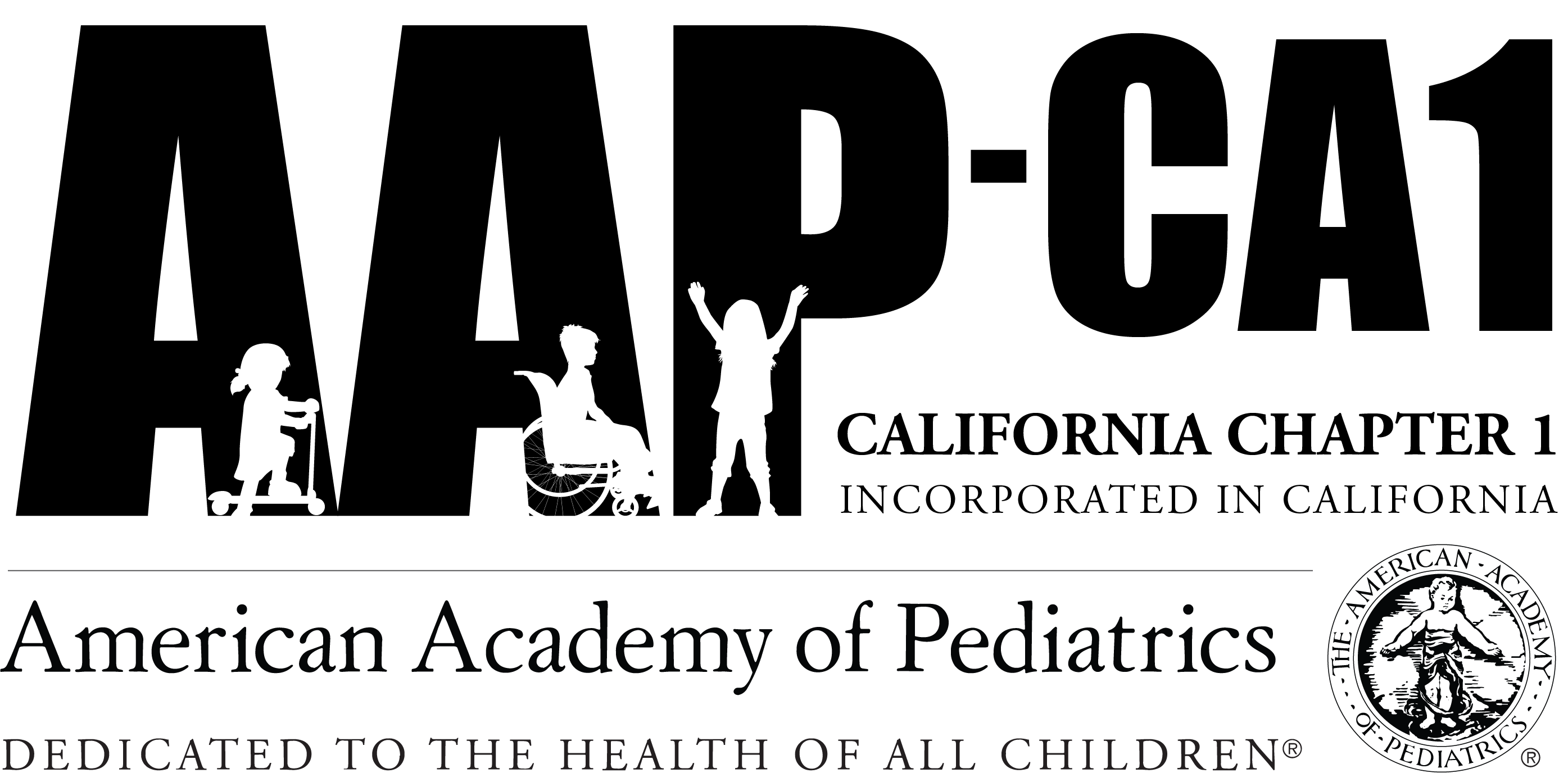RECENT PUBLIC CHARGE UPDATE
As of March 9,2021 the public charge has reverted back to its 1999 guidelines. Read more below.
What is Public Charge?
Read more about what the Public Charge rule is, and how it may apply to your patients. With recent changes in immigration laws, there is confusion surrounding the use of healthcare and public benefits. The Public Charge Rule is one law that has caused confusion.
The resources below are courtesy of the UCSF Pediatric Residency Immigrant Health Task Force.

Who Does the Public Charge Rule Apply To?
Public charge does not apply to all immigrants. The public charge rule applies to certain groups of people applying for a visa and/or green cards.
Public Charge rule DOES NOT apply to those with Temporary Protected Status (TPS) and people applying to be US citizens.

Which Public Benefits Are Considered?
As of March 9, 2021, the only benefits considered are cash support for income maintenance and long term institutionalized care.

Immigrant Health and COVID-Related Laws
Healthcare, Cash Assistance, Food Assistance and Unemployment Programs, their eligibility and how public charge affects them.
| Program Name | Eligibility | Public Charge? |
| Healthcare | ||
| Coronavirus Aid, Relief, and Economic Security (CARES) | Yes, all immigrants | Testing, prevention, or treatment for COVID-19 will NOT be used against immigrants in a public charge test |
| Families First Act (FFA) – enables states to provide testing to certain uninsured individuals through their Medicaid programs | Yes [1] | |
| Cash Assistance | ||
| Give2SF | Yes, all immigrants | NOT taken into account |
| CA Disaster Relief Assistance for Immigrants (DRAI) | Undocumented adult (18+) | |
| CARES – individuals earning <$75,000 eligible for one-time $1,200. Married couples each receive a check along with $500/child. | Need SSN for all (e.g. spouse, child) [2] | |
| Food Assistance | ||
| SNAP | Certain non-citizens, such as asylees, refugees, and some green card holders | Federally funded SNAP benefits may be included in a public charge determination [3] |
| WIC, FFA, and TEFAP (The Emergency Food Assistance Program) | Yes, all immigrants | NOT taken into account |
| Unemployment | ||
| Unemployment Insurance (UI) expansion via CARES Act | Need SSN. For regular UI benefits: Must be work authorized at the time they file for UI benefits. | Regular UI: NOT taken into account |
| Pandemic Unemployment Assistance (PUA) | New UI programs: TBD | |
| [1] Some states have defined testing and treatment for suspected COVID virus as emergency services covered by their emergency Medicaid programs. Emergency Medicaid is available regardless of immigration status, but applicants must meet their state’s other Medicaid eligibility requirements. In states that have not expanded Medicaid, for example, a nonpregnant adult without disabilities or children may not be eligible for services.
[2] There is an exception for spouses filing jointly where at least one spouse was in armed forces last tax year and at least one spouse has a valid SSN. [3] Though, few individuals who are eligible for snap are also subject to a public charge determination. |
||
View full infographic HERE
Source: https://protectingimmigrantfamilies.org/immigrant-eligibility-for-public-programs-during-covid-19/
Important to Know
 Benefits used by children are not included in their parents’ public charge determination.
Benefits used by children are not included in their parents’ public charge determination.- The Public Charge Rule does not restrict the use of resources themselves; however, the listed above resources may be included in public charge determination.
- Additionally, just because you use the above resources, does not automatically mean you are subject to public charge. Multiple factors such as age, educational status, health, and job are also included.
Chilling Effect

Despite the fact that the rule does not apply to all immigrants, the confusion surrounding it has created a “chilling effect” leading to decreased use of resources and healthcare by immigrant families, even those who the rule does not apply to. Learn more through these publications:
- Chilling Effects: The Expected Public Charge Rule and Its Impact on Legal Immigrant Families’ Public Benefits Use
- Responding to the Public Charge Rule: Immigrant Well-Being and Access to Services
- One in Five Adults in Immigrant Families with Children Reported Chilling Effects on Public Benefits Receipt in 2019
How to Approach Public Charge with Your Patients
Healthcare providers are considered a trusted resource by many families: you can help by providing counseling and directing families to resources.
Before counseling families, it is important to note:
- The rule is constantly changing. Stay up to date with the resources provided below.
- We are doctors, not lawyers. Do not offer patients legal advice. If they have questions about their specific situation, you can refer them to the free or low-cost legal resources below.
- Public charge and the decisions families are forced to make to support themselves is an emotional subject: be sensitive when discussing this and other immigration related topics with families
What Can You Do?
Provide families with basic information and direct them to the appropriate resources for additional assistance.
- Public charge does not apply to everyone, especially U.S. citizens and most current permanent residents
- The new changes only apply to people applying for certain green cards such as through a family member or employer, and applying for certain visas.
- Benefits used by children do not impact their parents
- Tell folks to get immigration help! No two immigration cases are the same. Every family needs case-by-case evaluation for what their immigration options and goals are.
- The public charge changes do not affect eligibility for public benefits – everyone can still apply for the services available to them.
Resources for Pediatricians
Protecting Immigrant Families
Up to date information on the rule and resources for families in multiple languages.
Learn More
Protecting Immigrant Families Campaign
Get an overview of Public Charge and find resources and information sheets in multiple languages.
Read More
Public Charge Factsheets
Get digestible information sheets about Public Charge provided by the Immigrant Legal Resource Center.
Read More
Patient Rights and Privacy
Learn from the ACLU how to best protect your patients rights, especially around the Public Charge Rule.
Read More
Resources for Families
California Rural Legal Assistance Foundation (CRLAF)
Provides free legal services regardless of immigration status. Visit the site below or call 916-446-7901.
Learn More
East Bay Naturalization Collaborative
Provides free to low cost legal services to immigrant communities. Visit the link below or call 510-251-2846 for English, Chinese, Vietnamese, Tagalog, Korea & Other Asian Languages. Call 510-952-7933 for Spanish.
Learn More
Self Assessment Tool
This tool is currently available in English at KeepYourBenefitsCA.org or in Spanish at TusBeneficiosPublicos.org. This tool is also available via text by texting “Benefits” (for English), “Libre” (for Spanish), “福利” (Chinese) or “lợiích” (Vietnamese) to 650.376.8006.
Learn More
Public Charge Outreach Toolkit
This toolkit is provided by the Immigrant Legal Resource Center to get proper information on public charge as of September 2020.
Learn More
Public Charge Referral List
Provided by the CA Department of Social Services, get more information about external resources.
Learn More
UFW Foundation
The United Farm Workers of America take part in a diverse array of advocacy and education campaigns.
Learn More
Public Charge Resources for Families Page
Learn more about how to support families.
